Full Reviews
Full game reviews as we beat them, there will be a balance of both new and old games reviewed. We review the basics of the game and deliver scores in a few categories and an overall score out of 10.
Illusion of Gaia
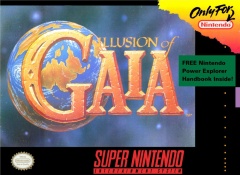 I didn’t play a whole lot of Enix games growing up. I rented a few titles for the Super Nintendo, including E.V.O.: The Search for Eden, Ogre Battle, and 7th Saga, but it wasn’t until I beat Star Ocean 2 during college that I could poke out the Enix notch in my belt. Their merger with Squaresoft in 2003 blew my mind, but I had grown up in the world where publishers were like armies, constantly battling it out with each other for supremacy; but in the real world it was all business, and the merger made sense.
I didn’t play a whole lot of Enix games growing up. I rented a few titles for the Super Nintendo, including E.V.O.: The Search for Eden, Ogre Battle, and 7th Saga, but it wasn’t until I beat Star Ocean 2 during college that I could poke out the Enix notch in my belt. Their merger with Squaresoft in 2003 blew my mind, but I had grown up in the world where publishers were like armies, constantly battling it out with each other for supremacy; but in the real world it was all business, and the merger made sense.Illusion of Gaia was released during the time when Enix was in a heated battle (business and fanboy-wise) with Squaresoft on the Super Nintendo platform. In its six year lifespan, both publishers released over 30 games each, many competing directly in sub-genres that seem too similar to be considered a coincidence. One of these face-offs was Secret of Mana from Squaresoft against Illusion of Gaia from Enix. Released in 1993, both games were action RPGs that happily broke the mold of the Final Fantasies and Dragon Quests.
But in the end, Squaresoft easily won the action RPG battle and the Super Nintendo war. Secret of Mana was an engrossing, multiplayer tale with a huge variety of weapons and magic, Illusion of Gaia was a rather rote, singleplayer, cobbled-together adventure with little variety. Here’s its review.
The Legend of Zelda
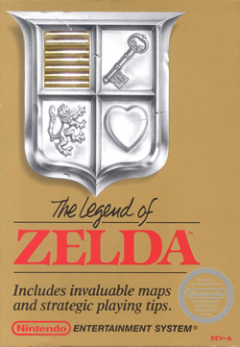 Achievement Unlocked: Review a game older than you.
Achievement Unlocked: Review a game older than you.Zelda may be the most beloved video game franchise, but I've never counted myself among series super-fans. Since cutting my teeth on the series with Ocarina of Time, I've merely enjoyed all but a handful of games in the series. Don't get me wrong, they're all great, but I wouldn't put any in my top ten.
That said, I like checking out each title and comparing it with the rest of its ilk. Other than the experimental black sheep Zelda II: Adventure of Link, the first Legend of Zelda may be the series' most divisive game. Fans can't seem to agree whether the game's old school difficulty and unguided progression make it dated or just different. Lacking an in-game overworld map and never funneling players away from difficult areas, the NES original certainly requires more of its players than any Zelda since.
Nintendo recently launched its 3DS Ambassador program, giving the system's early adopters ten free NES games. I had been meaning to check out several of the ambassador titles, but none more so than The Legend of Zelda. Fifteen hours and a princess rescue later, I'm ready to weigh in on the Dated vs. Different debate.
Plants vs. Zombies
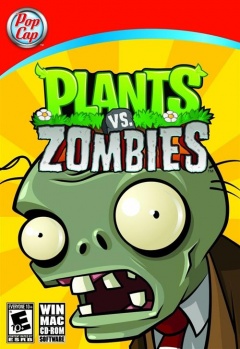 Plants vs. Zombies is a game I've been eyeing for a while. It regularly tempted me at $10 Steam with even cheaper sale prices. This summer's sale finally put me over the edge. Every so
often you need some good tower defense action, and PvZ seemed like a unique yet highly praised take on the genre. Its cartoonish,
Popcap/flash feel and simple five-lane setup makes things perfect for
beginners. And it has enjoyed massive success over a huge variety of
platforms. Originating on PC, PvZ has since expanded to every modern
platform imaginable, both traditional and mobile. Popcap is undeniably a casual gaming powerhouse. The Bejeweled and Feeding
Frenzy creators certainly know how to make products and pricing that
clicks with the average consumer. They've been so successful that EA recently purchased the
company for ~$750 million.
Plants vs. Zombies is a game I've been eyeing for a while. It regularly tempted me at $10 Steam with even cheaper sale prices. This summer's sale finally put me over the edge. Every so
often you need some good tower defense action, and PvZ seemed like a unique yet highly praised take on the genre. Its cartoonish,
Popcap/flash feel and simple five-lane setup makes things perfect for
beginners. And it has enjoyed massive success over a huge variety of
platforms. Originating on PC, PvZ has since expanded to every modern
platform imaginable, both traditional and mobile. Popcap is undeniably a casual gaming powerhouse. The Bejeweled and Feeding
Frenzy creators certainly know how to make products and pricing that
clicks with the average consumer. They've been so successful that EA recently purchased the
company for ~$750 million.For the most part, PvZ exemplifies this success. It creates a casual-friendly atmosphere with calculated progressive learning combined with enough longevity and a tad of optional difficulty to round out the complete package. The game starts slowly, at first holding your hand with only a couple plant options (towers) available to defend your house from a weak zombie horde on a completely barren level. With only five lanes to defend, beginners will learn quickly what it takes to operate. In case they make mistakes, the game includes a get-out-of-jail-free card, in the form of zombie-clearing machines that activate and clear the lane should a zombie make it past the plants. For a while, the game introduces a new plant on almost every level, encouraging the player to try them out and discover what they're worth. Soon enough, juggling several plant types on more obnoxious levels will be a requirement.
Tower Defense Standoff - GRave Defense HD and Fieldrunners HD
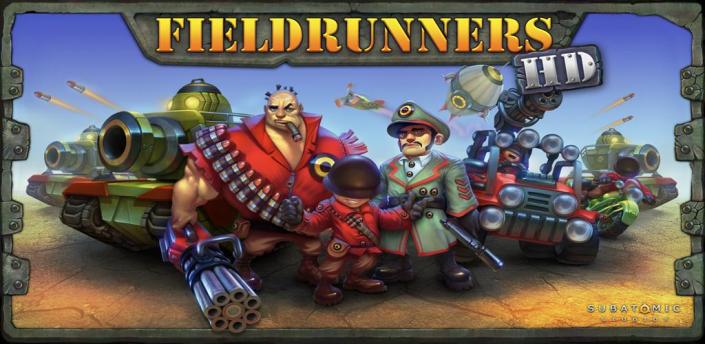 I’m pretty new to the tower defense genre, I missed out on the first few waves of games including the massively popular Desktop Tower Defense, and first experienced it with Plants vs. Zombies, which is probably a sub-genre of its own. But since buying my Android phone, I’ve been exposed to a lot of games I couldn’t imagine myself playing even a few months ago. Two of those are tower defense games.
I’m pretty new to the tower defense genre, I missed out on the first few waves of games including the massively popular Desktop Tower Defense, and first experienced it with Plants vs. Zombies, which is probably a sub-genre of its own. But since buying my Android phone, I’ve been exposed to a lot of games I couldn’t imagine myself playing even a few months ago. Two of those are tower defense games.Fieldrunners HD and GRave Defense HD are great examples of two distinct approaches at the tower defense genre. Both are easy to pick up and play for 10 minutes, but are amazingly effective at grabbing you in for over an hour. However, that is where the similarities end, and it is their differences that really define them.
Both titles are available right now for under $3 on the Android Market, and Fieldrunners is also available on a wide variety of devices including iOS and the Nintendo DS. Here’s my short reviews of Fieldrunners HD and GRave Defense HD.
The Secret of Monkey Island: Special Edition
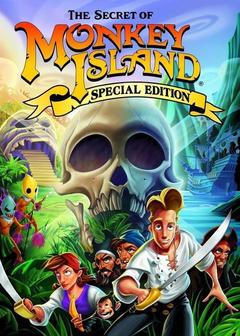 I first played The Secret of Monkey Island about 20 years ago. This was an era of launching games from DOS, Commander Keen, and wheel spinning copy protection. I played the game with my cousin, who would frequently lose the Dial-a-Pirate code wheel forcing us to wildly guess at the game’s opening question.
I first played The Secret of Monkey Island about 20 years ago. This was an era of launching games from DOS, Commander Keen, and wheel spinning copy protection. I played the game with my cousin, who would frequently lose the Dial-a-Pirate code wheel forcing us to wildly guess at the game’s opening question.The Special Edition released in 2009 thankfully does not have any code wheels (or even worse: always-on internet connection), but does feature completely redone high resolution art, a full voice cast, and the same brand of humor fans of the game know and love.
I’m personally a huge fan of the Monkey Island series, with the second holding a very special place in my heart and the third (gasp!) being my favorite. And while I beat the original when I was younger, I never held a lot of nostalgia for it, so this review is actually coming from a fan of the series who likes the first one the least in the trilogy And no, there is no fourth game.
Paul Eastwood originally reviewed the Special Edition two years ago when it was new, I finally got around to beating it this weekend after having it sit in my Steam library since release. Here is my review of The Secret of Monkey Island: Special Edition.
Jamestown: Legend of the Lost Colony
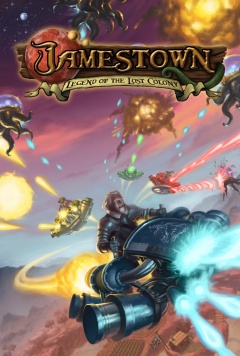 It’s been years since I played a shoot ‘em up. I bought Ikaruga during college basically as a blind buy, and Steve and I played a ton of four player Giga Wing 2 on the Dreamcast, but since then? Well, I played the first hour of Pocky & Rocky... that’s about it. I partially blame this on my system of choice being the DS for the last few years, and also because I’m not very good at the genre. Bullet hell is a term for a reason.
It’s been years since I played a shoot ‘em up. I bought Ikaruga during college basically as a blind buy, and Steve and I played a ton of four player Giga Wing 2 on the Dreamcast, but since then? Well, I played the first hour of Pocky & Rocky... that’s about it. I partially blame this on my system of choice being the DS for the last few years, and also because I’m not very good at the genre. Bullet hell is a term for a reason.But I was gifted Jamestown: Legend of the Lost Colony during the Steam Summer Sale (thanks Rowan Kaiser, writer at The A.V. Club), so I had the obligation to return to the shmup, essentially kicking and screaming. I knew very little about the just released indie shooter, so here are the quick details: Jamestown is an alternate history story of early American settlers on Mars. Suspension of belief required. Just imagine 17th century Europeans had spaceships and decided to settle Mars instead of North America.
Also know this: Jamestown is a great game, here’s my review.
Captain America: Super Soldier and Captain America: Super Soldier
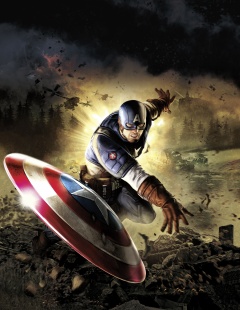 Aww yeah, it's a SHOVELWARE SHOWDOWN!
Aww yeah, it's a SHOVELWARE SHOWDOWN!In the last two weeks, I started Captain America: Super Soldier for both the PS3 and Wii. At hour's end, I decided to keep playing each game, but with the expectation that I wouldn't actually finish either. As it turns out, I stuck with both through the credits. And I didn't do it solely for masochism's sake: movie license hex be damned, neither version of Captain America is mere shovelware. They won't be gunning for any Game of the Year awards, but they are games worth playing for the right price.
Okay, so they're not bad. But which version of Captain America: Super Soldier is the not baddest? The choice isn't as simple as HD versus SD, like in many Wii port afterthoughts: the parallels are there, but these are two very different games. In classic head-to-head style, check out how each of the versions stacks up against each other in their major elements.
Grand Prix Story
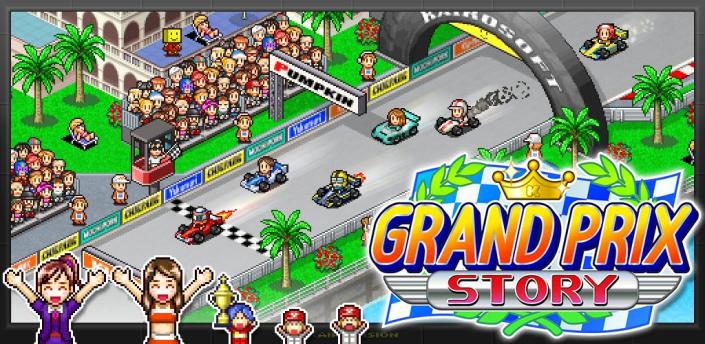 Kairosoft has quickly become my favorite developer on mobile platforms. With the English release of Game Dev Story last year, Kairosoft has placed themselves as the premier simulation creator on iOS and Android. Game Dev Story was followed up by the SimCity-esque Hot Springs Story, and then Android received the exclusive Grand Prix Story a few months back (Pocket Academy, a high school simulation was released exclusively for iPhone and iPad).
Kairosoft has quickly become my favorite developer on mobile platforms. With the English release of Game Dev Story last year, Kairosoft has placed themselves as the premier simulation creator on iOS and Android. Game Dev Story was followed up by the SimCity-esque Hot Springs Story, and then Android received the exclusive Grand Prix Story a few months back (Pocket Academy, a high school simulation was released exclusively for iPhone and iPad).Kairosoft has been a very active developer the last few years in Japan, with over 20 releases, including already released sequels to some of their English titles. Their lineup of games ranges from the ordinary to bizarre to simply inspired, with Game Dev Story serving as a catalyst for new markets.
I reviewed Hot Springs Story a few weeks ago, and quite enjoyed both the similarities and differences it had to Game Dev Story. From the games released outside of Japan, there appears to be two types of gameplay: the straight up numbers game like Game Dev Story, and the Hot Springs style layout designer/builder. Grand Prix Story falls under the former, Pocket Academy under the latter. Here's my review of Grand Prix Story for Android, played on an EVO 4G. I hope to have a Pocket Academy review soon.
The Witcher
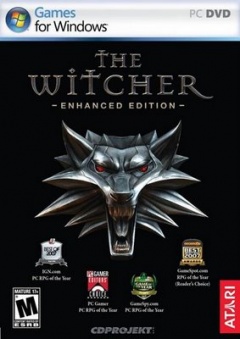 Very rarely do developers aim to make AAA PC exclusives anymore. As one
of the most well regarded action-rpgs in recent history and aided by
numerous recommendations, I felt it was my duty to try The Witcher. Its
developer, CD Projekt, is a Polish firm who's been translating and publishing PC games since the mid-90s. Recently they've been spending money to expand, opening up the RED STUDIO for game development and creating Good Old Games as a DRM-free retro gaming service for modern computers.
Very rarely do developers aim to make AAA PC exclusives anymore. As one
of the most well regarded action-rpgs in recent history and aided by
numerous recommendations, I felt it was my duty to try The Witcher. Its
developer, CD Projekt, is a Polish firm who's been translating and publishing PC games since the mid-90s. Recently they've been spending money to expand, opening up the RED STUDIO for game development and creating Good Old Games as a DRM-free retro gaming service for modern computers.So far, only The Witcher and its sequel have been released by the studio, with Witcher coming out in October 2007 and Assassins of Kings hitting just two months ago (in May 2011). These projects are large in scope, using source material from a Polish novel series and brought to life by large development teams. The Witcher immediately brings a fresh start to the tale as our hero Geralt mysteriously reappears with amnesia, after apparently being killed by an angry mob. So let's see how this story goes. I'm playing the latest version, the Enhanced Edition Director's Cut.
Cut the Rope
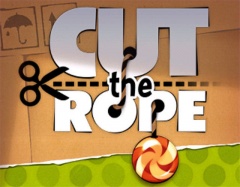 I apologize for writing more about mobile games lately than general mainstream console titles. I’m in the middle of moving and sitting down for 15 minutes with Hot Springs Story, Angry Birds, or Cut the Rope is a lot easier than an hour or two with Dragon Age II.
I apologize for writing more about mobile games lately than general mainstream console titles. I’m in the middle of moving and sitting down for 15 minutes with Hot Springs Story, Angry Birds, or Cut the Rope is a lot easier than an hour or two with Dragon Age II.So I’ve been tearing through a series of cheap or free games on the Android, taking advantage of Amazon’s free app of the day and sales on the Market. The great thing about mobile games, even over DS titles, is that they’re so darn cheap, if you don’t like the game, delete it and move on. While I could write a few paragraphs on a game I only gave 15 minutes then promptly deleted, I’d rather focus my energy on games I really enjoyed and believe are worth even their minor asking price.
Cut the Rope recently landed on the Android platform after a successful run on Apple’s iOS, and after first hitting the indie market GetJar for free (supported by ads), it is now on the official Market and Amazon ad-free for a dollar. Here’s my review of Cut the Rope on Android.
